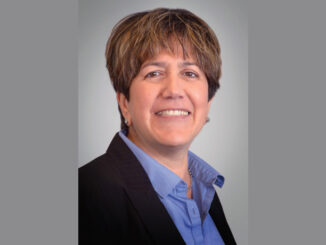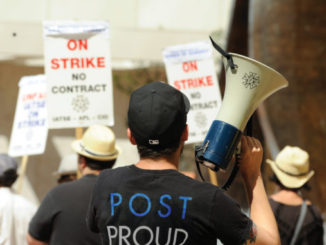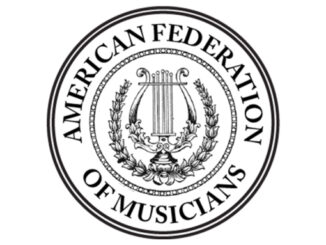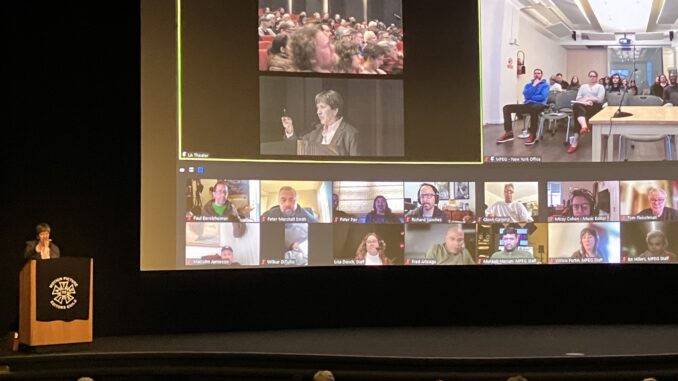
Will emerging and generative artificial intelligence technology in post-production eliminate jobs for Editors Guild members?
That question was at the forefront of discussion by members who showed up in large numbers at a bicoastal and online General Membership meeting, or Town Hall, last Sunday. They stared down sobering news and calculations that much is at stake on the eve of negotiations for the IATSE Basic Agreement, not least the funding needs of the Motion Picture Industry Pension and Health Plans (MPIPHP).
“The bulk of our members feel worried that their jobs will be impacted within the next three years by some form of emerging technology, artificial intelligence” as indicated in our local survey, said National Executive Director Cathy Repola. She hailed the creation of the Guild’s Emerging Technology Committee, created by the Board of Directors in 2022.
“I think we’re way ahead of the curve in terms of the research that we’ve done. I hope that we will all stay really strong and fully united about the impacts of artificial intelligence. And really, I don’t think we have a choice,” said Repola.
Repola asked the audience of approximately 210 members gathered in the Directors Guild Theater in Los Angeles and 35 at the New York Guild office — along with 875 members logged in online — to raise their hands if they were working again following the long dual-strikes of last year, in which production has yet to fully ramp up again. About half the room raised their hands.
“I’ve talked to so many members. I know, and you know, that people are suffering still. They haven’t gone back to work. They’ve lost so much money; they’re worried,” Repola said.
At a recent panel of Hollywood labor leaders, International President Mathew Loeb sounded off about the hard reality of the industry in the wake of the strikes, and regarding the upcoming contract talks, he insisted that “nothing’s off the table, and we’re not going to give up our strength and our ability because [the studios] sapped us.”
“Everybody’s bank account got sapped because they were unreasonable for months and months. My folks aren’t going to just settle,” Loeb said to applause.
“Folks are fed up. And I don’t know what to call it, if it’s a post-Covid wake of dissatisfaction, but people are ready to fight and the studios would be ill-advised to think that they’ve weakened us to the point that we can’t,” he said.
The IATSE will link arms with the Teamsters Local 399 and the Hollywood Basic Crafts unions starting March 4 to jointly negotiate the funding of the health and pension plans with the Alliance of Motion Picture and Television Producers (AMPTP). Syncing contract negotiations with other unions is unprecedented in recent cycles and evidently a strong opening play by united labor to maximize leverage and solidarity. A joint IATSE-Teamsters rally is scheduled for this Sunday in Van Nuys.
Repola reported that due to the strikes, one of the pillars of funding of the MPI plans — hourly contributions from employers on behalf of members working under the Basic Agreement — dropped off significantly, by approximately $280 million. That and continuously rising health care costs means the plans require more funding than in previous negotiation cycles.
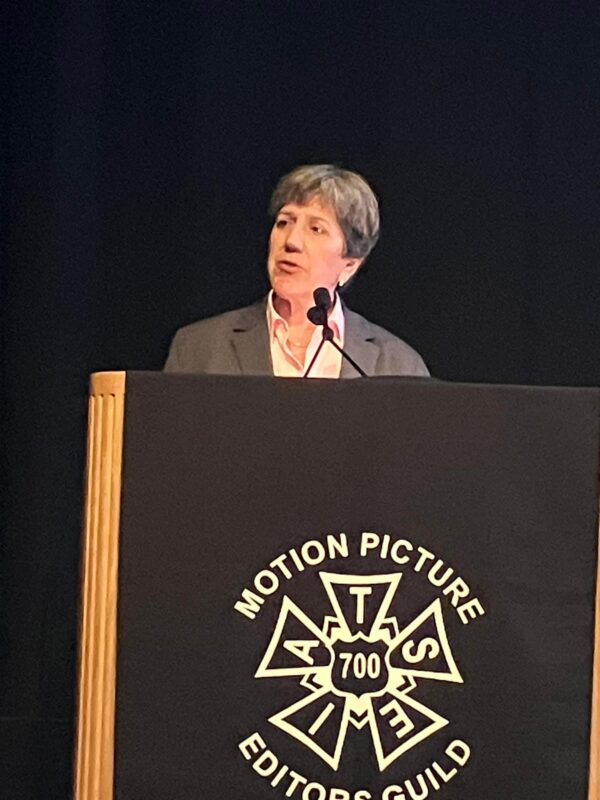
Repola encouraged members to have resilience. “We’re really kind of at a crossroads in this business. Everything is fluctuating and changing so much, and it is our job and my job and the job of all the heads of the locals to protect our members,” Repola said.
“Between the funding of the MPI plans and artificial intelligence, we have to go in there, not give up, not stop fighting, not agree to a contract that we should not agree to,” she added to resounding applause.
“You are the union, not me. It’s your contract, it’s your livelihoods, it’s your lives. And so I will do my best in the course of all of that,” she promised.
A.I.: ‘Things Are Going to Change’
Emerging Technology Committee co-chair Asher Pink, an assistant editor, reviewed a summary report that analyzed emerging technology relevant to occupations in production, as well as the opportunities and the risks to the primary classifications of the Editors Guild — from loggers and story analysts, to sound and music editors, re-recording mixers and picture editors.
“Things are going to change over the next several years and we anticipate major shifts in post sound and unscripted editorial at the current trajectory,” Pink said. “Assistant editors will need to adapt to new workflows and adopt new skill sets as certain tasks become automated and new tasks develop.”
Pink urged Editors Guild members not to give too much weight to “sky-is-falling tech articles on Facebook,” saying those articles are highly editorialized or miss key nuances related to jobs in post-production.
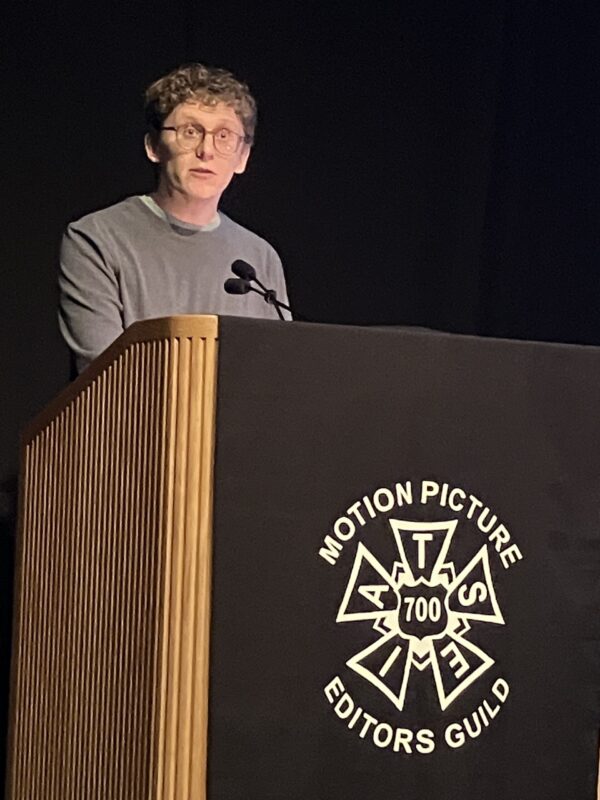
A.I. “does not mean that our future is hopeless or bleak,” Pink insisted. “We are still the most skilled, most reliable, most adaptable post-production workforce in the world. Our humanity should quash any debates over perceived obsolescence. There are opportunities for a mutually beneficial relationship between the studios and labor, provided that the studios recognize and value the expertise of our labor, and that we adapt to the new tools to provide added value to the producers.”
Guild members are clearly engaged in this year’s negotiation cycle, and Repola tirelessly answered their pointed questions for upwards of two hours. She expressed her belief that there is a strong unity among the 13 locals of the Hollywood bargaining alliance, which includes the multitude of production crafts from coordinators, set and costume designers, hair and makeup artists, camera and lighting, through post-production.
“The heads of all the locals in Hollywood have been engaging with one another in a brand new way that I’ve never seen happen before,” Repola said. “And nobody is interested in taking a contract back to the members that they’re not going to like.”
“We’re not asking for the world. We’re asking for our pension and health plans to be protected, for our jobs to be protected. We want to take an agreement back to the members that they actually want to ratify.”


